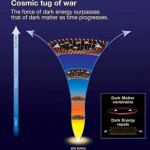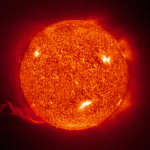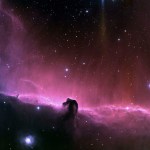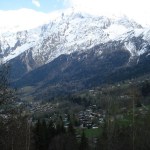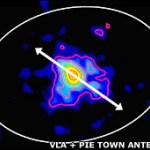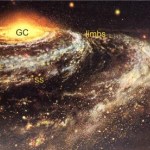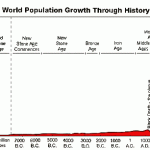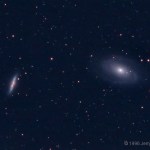
In a comment on my last post, What is Dark Energy, Kendall asks the following, which is such a good one I think it deserves its own post:
I thought the expansion was accelerating? Aren’t you saying that it is on its way down to 85% of its current rate? Sounds like expansion is slowing, but still leaves us with an open universe…
People do say the expansion of the Universe is accelerating. But that doesn't mean that the expansion rate is accelerating. It means that if you take a look at any one galaxy that isn't gravitationally bound to us in the Local Group (that is, any big galaxy that isn't…
You've all heard these words before. Dark Energy. But what is it, and why are we stuck with it? Let me start by telling you a story.
Imagine, for a minute, that you have a candle. You know everything about this candle, including how bright it is and how far away it is from you. Like so:
Now if I move this candle twice as far away, I know it's going to be one-fourth as luminous. If I move it three times as far away, I know it's going to appear one-ninth as luminous. And if I move it a thousand times farther away, I know what I see is going to be one-millionth as luminous as the original…
Tonight, from 7:00 PM - 8:30 PM Pacific Time, I will be Dr. David Livingston's guest on his radio program, The Space Show! I have no idea how it's going to go or if I'll be able to communicate clearly on an audio-only format, as I've never tried before, but I'm really looking forward to the experience.
You can listen live via internet radio by going to http://www.thespaceshow.com/live.htm at the appropriate time, or by heading to the RSS feed afterwards and downloading the episode. Don't forget to leave your comments if you listen to it!
What's going to happen to all the stars in the Universe as they get older? Well, just as nothing can live forever, stars can't live forever also. Why? Because they run on fuel: burning hydrogen into helium, for example. When they run out of fuel, something's gotta give. Barbara Ryden reminds us of an excellent and appropriate quote by Dylan Thomas:
Do not go gentle into that good night.
Rage, rage against the dying of the light.
But what exactly happens to the star depends very sensitively on what the mass of the star is.
If you've got a tiny little star, less than about 40% of the mass of…
Ever seen the Horsehead Nebula? If you look at the easternmost star in Orion's Belt through a telescope, you're likely to see something like this (the star is just off the image to your left):
A pretty little nebula, to be sure, but it doesn't look all that spectacular. I mean really, there's a fancy emission nebula behind some dust, that happens to look like a horse's head. It's mostly cloud-watching in space.
But then I saw a picture where Star Shadows Remote Observatory decided to over-expose the horsehead nebula and the area around it. Now, overexposing a region of sky is how you see…
Take a look at this picture, and tell me where the brightest parts and dimmest parts are:
Well, obviously, just to the left of the color gradient, it gets darker than anywhere else. Also, just to the right, it gets lighter than anywhere else. And that's the way it is, isn't it?
Or is this an optical illusion; a trick of your eyes? Let's chop the image up into three parts and find out:
Well damn, there isn't a "darker band" or a "lighter band" there at all, this is just your inability to see properly! This effect of your eyes is known as a Mach band. (Maybe that will be the new title of the…
First things first: this week's Carnival of Space is up at Brian Wang's site, Next Big Future. You can find my post on Mars or Arizona? up there.
Now, what comes next for me, since I don't like it here in Arizona? Well, the Dangerman audition didn't work out (I never heard back), and I've been scoping out the Portland, OR area, which could work out well. But I got an email earlier this week about a job vacancy at ESO (the European Southern Observatories). They are looking for someone to take on the role of being head of the ESO public outreach office! Really, this would be a wonderful…
Two summers ago, I was in Les Houches, France, for a summer school that turned out to be one of the best experiences of my life. Seriously, we'd wake up every day and this was the view from the school:
Well, the University/Institution that ran the school sends periodic updates to me. And they linked me to this release. Here's the interesting and (if it's true) sensational claim that the release makes:
Recently, a team of theorists ... performed a new analysis of all available CMB and LSS data including the WMAP and Sloan data and favor an inflation model where exist primordial gravitational…
Starts with a bang reader Dumb Ass Dave points us to this BBC article about the discovery of a planet that's only just forming around a new star. The planet is surely less than 100,000 years old, although the 1,600 year old figure quoted in the article is probably hogwash.
How do you find it? Take a look at this picture below, taken in radio waves:
That big blurry thing in the center? That's a newly forming star, with a proto-planetary disk around it. But see that little blob in the upper right? That's a planet forming up there! When they do their analysis and determine its mass, it turns…
There's a graduate student that I'm sort-of mentoring/working with at Arizona, named Xiaoying Xu (hi Xiao!). She's bright and curious, and she asks some very good questions. She asked me one yesterday that's pretty tough to wrap your head around:
How do I explain to someone why light doesn't age?
Well, here on Earth, time progresses at a certain speed. That is, if I measure how many seconds tick by as the Earth revolves once around the Sun, I'll get 31,556,926 seconds. (31,558,150 if I'm measuring a sidereal year.)
But let's say in the course of that year, I put you on a rocket ship, and…
There was a paper posted today that I thought was an April Fools' Day joke, entitled Was There a Big Bang? Ha ha, thought I, of course there was; I just wrote all about it two weeks ago. But no, this is a legitimate paper, or at least is attempting to be. (There was even a brief write-up on Universe Today.)
First off, let me tell you who the authors are: two retired scientists who used to work on space missions back in the 1970's. They were instrument guys, taking data and making sure the spacecraft ran. But as they got closer to retirement, they started proposing explanations for cosmology…
There are a number of parameters that we deal with in cosmology that have no dimensions; that is, they're just numbers. And yet, there are a remarkable number of coincidences that just "happen to be that way" in our Universe.
Douglas Scott, in this paper, points out some of the more puzzling ones, including:
The age of the Universe (13.7 billion years) is exactly three times the age of the Solar System (4.5 to 4.6 billion years).
The dark matter fraction of the Universe (OmegaDM=0.23 +/- 0.02) is equal to the Helium mass fraction (Yp=0.238 +/- 0.010) of the baryons.
The Hubble constant (H0…
Those of you who know me know that I'm unhappy living here in Arizona. The landscape and ecosystem of the Sonoran Desert, while beautiful to many, is too dry, rocky, and devoid of life for me to enjoy living here.
After my time here, I've decided that, were it somehow offered to me, I would probably pass on the opportunity to go to Mars. And so I present to you a little game I call "Mars or Arizona," where I will show you some pictures, and you get to guess which ones are pictures of Mars and which ones are pictures of Arizona. Sound easy?
Well let's bring on the pictures, and see if you…
I remember being a kid and taking karate lessons. How cool was it to go somewhere for the purpose of learning how to kick ass? It was fun, of course, and one of the things you learned how to do was to attack (strike, kick, and punch) with your entire body, not just with your limbs.
Maybe the coolest parlor trick we learned was how to break a wooden board with our bare hands. (I remember surprising the hell out of Leon Hodge years later in High School by doing it in a history class one day; Hi Leon!) We also heard the story that the way this worked was that you compressed air molecules so much…
There's a movie coming out on Creationism, Intelligent Design, and Evolution, called Expelled, and it's narrated/hosted by Ben Stein (right), a TV/film personality who is an overall intelligent guy (and used to have the TV show Win Ben Stein's Money), and used to be a Nixon speechwriter. Politically, he's quite conservative (for example, immediately following 9/11 he gave a speech where he called abortion "the worst form of terrorism"), but this movie is apparently one of the worst abuses of science since What the Bleep do We Know?! came out.
The movie has an innocuous enough premise: is…
WARNING: Sensationalism ahead! Are you kidding me, Newsweek? They really titled their article Will Physicists Find God? Presumably, the title is named because physicists are searching for the Higgs Particle, and the title is taken after Leon Lederman's (mediocre, IMO) book, The God Particle. Leon's a pretty humorous guy, and was told by his Editor (according to him, anyway) that he couldn't name his book, "The Goddamned Particle," which is what he called the Higgs, so he shortened it.
For better or worse, the article is an interview with Steven Weinberg, one of the most illustrous living…
So last week I was up at Pacific University in Portland, OR for a job interview. As part of a faculty interview, you have to lecture on a topic for undergraduates, but they give you the topic just a couple of days before. My topic was Gauss' Law, which talks about the relationship between an Electric Field and an Electric Charge. Well, the same law holds for Newton's theory of Gravitation with a gravitational field instead of an electric field and a gravitational charge (i.e., mass) instead of an electric charge.
So I'm at work today thinking about this, doing the thing I do messing around…
Last week, the brightest gamma-ray burst ever was observed. (See here.) I wanted to know what it was that caused this bright explosion that, despite it being at redshift z=0.94 (or about 7.5 billion light years away), it was visible on Earth with the naked eye!
Well, a scientific paper was written on the observations of this burst, named GRB 080319B, or the second GRB observed on 03/19/08. Let me take you through the highlights. First off, here's what it looked like, in gamma-rays (left) and the afterglow in the optical/UV (right):
When we look from Earth, the faintest objects we can see…
This is some very basic biology: when resources are unlimited and there are no pressures on a species, its population grows exponentially. There's also no evolution other than random mutations; without selection pressures (regardless of whether it's natural or artificial), the genetic information content of a species doesn't change appreciably.
Biologists make use of this to perform tests on certain cells. If you simply put a population of cells in a petrie dish and left them there, they start out by doing this:
They divide. They take over the dish. But then, they run out of room. And when…
Cameras, CCDs, prisms, grisms, etc., are all some of the instruments that can go on top of telescopes to help us see things better. We haven't really increased the size of telescopes so much as we have the quality and ability of the apparatus that go atop them. Take a look at various pictures I've stolen off the web, all taken by (avid) amateur astronomers in different years. The pictures are of M81 and M82, two galaxies in a group that make up possibly the nearest cluster of galaxies outside of the local group. (The closest is either the M81 group, the Centaurus group, or the IC 342 group.)…
